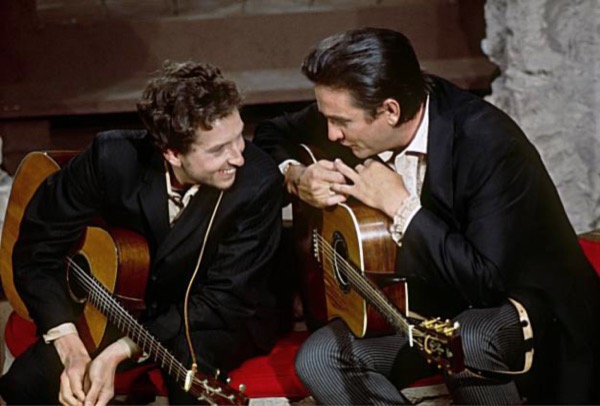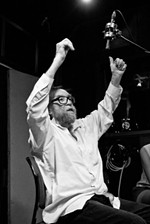Bob Johnston’s Great Lost Johnny Cash & Bob Dylan LP
Late producer set the mood for one of music’s great summits
By Louis Black, 11:40AM, Tue. Aug. 18, 2015
Producer Bob Johnston died Friday. This is a chapter from my online book Is It Rolling, Bob? Now that Johnston and Johnny Cash are no longer with us, maybe Columbia will finally release this extraordinary album.

Now there are many legendary lost albums – some never released, others released but so halfheartedly that the few copies that were released are essentially impossible to find. There have been many different reasons for these albums never coming out. Sometimes an album was announced, but recording never even began, while other projects were abandoned before recording was finished.
Sometimes the problem was the label’s very different take from the artists’ on the quality/commercial potential of the album, while other times the acrimony was among band members or with the group’s management. Probably the single biggest cause has always been the artist’s dissatisfaction with either the work or its contemporary music climate.
A recording of Bob Dylan and Johnny Cash performing songs together for over two hours in a Nashville studio in February 1969, produced by Bob Johnston, is one of the acknowledged great unreleased albums. In every way, the recording is quintessential Johnston. It features his strengths as a producer: Everyone’s clearly having a great time; the performances are unique, laid-back, and flowing; the playing is crisp; and the sound is very good, with a mic'ing system that captures it all.
The other ways in which it’s so typically Bob Johnston are not as meritorious. Way too often, writers buy Johnston’s jive: That he really didn’t do much on many of his albums but rather just let the artists go off on their own. They also tend to underestimate the quality of his recordings. All too often, these Dylan/Cash recordings are regarded as being more important historically than musically. Certainly, crucial to the enjoyment of these recordings is the awareness that two of the great musical talents of the past half-century are sharing an intimate performance.
The two voices together on these recordings, however, almost always work. Sometimes they know the same version of a song, and sometimes they veer away from each other. Some songs sound as if they were rehearsed for a long time; others sound as though the two musicians had never met. They do an overly long version of “Careless Love” that could have kept on keeping on even longer without raising any complaints from me.
The song is traditional, with authorship of various versions claimed by everyone from W.C. Handy, Lonnie Johnson, and Bessie Smith to Fats Domino, Dock Boggs, and Janis Joplin. Their version wanders along, taking on its way many a leisurely detour. The rich, dark contradictions of “You Are My Sunshine” are clearer in the Dylan/Cash version than in many others. They cover “Good Ol’ Mountain Dew.” Cash does a hymn at Dylan’s suggestion, though it becomes very obvious very quickly that Dylan remembers little of the song.
I’m not sure who plays in the band. I’m virtually certain it’s Carl Perkins on guitar, both because of the sound and because Cash calls out his name any number of times. Although when I asked Johnston about this, he couldn’t remember. Any story involving either Bob Dylan or Johnny Cash comes in so many versions that it’s nearly impossible to separate myth from reality. Adding them together just generates more fog while adding no clarity.
Cash (accompanied by June Carter Cash) first met Dylan (accompanied by Joan Baez) in the early Sixties at the Newport Folk Festival. Listening to Johnston’s story, one gets the impression that Cash was a bit in awe of Dylan, especially as a writer. Although they clearly perform as equals, the recording sounds very much as though Dylan is acquiescing to Cash. It sounds like Dylan is working at it a lot more than Cash – which detracts not a whit from Cash’s performance.
The great Richie Unterberger, in the All Music Guide, observes that, “The pair run through easygoing, rockabilly-tinged versions of Dylan songs, Cash songs, old Sun rockabilly chestnuts (‘That’s All Right Mama’ and ‘Matchbox’), and a bit of country gospel. Cash, in fact, dominates the proceedings: He sings lead more often, and the mere two Dylan tunes (‘Girl from the North Country’ and ‘One Too Many Mornings’) are outweighed by a larger heaping of Cash classics (‘Big River,’ ‘I Walk the Line,’ ‘I Still Miss Someone,’ ‘Ring of Fire,’ ‘Guess Things Happen That Way’). The CD might even appeal more to Cash fans than Dylan ones, especially as Dylan’s singing is not up to scratch: his timing is off, he often sings on one note, and he even needs to be occasionally cued by Johnny for the right words.”
Unterberger underestimates the charms of this recording. Dylan’s often in fine voice, trying out different tones and even yodeling. Still, it’s apparent why Columbia didn’t release these tracks at the time. Even Cash said, “The songs had no starting place and no stopping; we’d get into them and everyone would join in. ... Bob and I did ‘Careless Love,’ whatever we might know the words to. ... There’s a song or two that’s good enough to put out, but there’s not an album there.”
The only track released was their version of “Girl from the North Country.”
Especially noticeable throughout the recordings is just how sweet and lovely Dylan’s singing and harmonies with Cash are. Someone once asked Bob Johnston how much of an influence Cash had on Dylan’s singing. In particular, they pointed to Nashville Skyline, the first Dylan album recorded in Nashville that was clearly rooted in traditional country.
Dylan had already recorded Blonde on Blonde and John Wesley Harding with Johnston in Nashville, but it’s hard to think of the former as rooted – it’s so of American music while being completely transcendent – and the second is so generously eccentric. Johnston pointed out how Dylan was always experimenting and had significantly changed his vocal style and tone on each of four albums in a row: Highway 61 Revisited, Blonde on Blonde, John Wesley Harding, and Nashville Skyline. Dylan’s singing with Cash offers a fullness and clarity of tone that complements the latter’s voice while strongly reminding one of Nashville Skyline.
Dylan & Cash Recording Together
As Bob Johnston recalled:
Dylan and Cash together was quite remarkable. Once while Dylan was in town, I remember I was recording him, I think, in the daytime and Cash at night, if I’m not mistaken. Cash came in or Dylan came in to ask me, “What are you doing?”
“What are you doing?” was my response.
“Recording,” they said.
“Well, I am too.”
I went back to work. I think they went to get something to eat. They asked if I wanted to come.
“No, I’m going to stay here,” I answered.
While they were gone, I put lights in the studio, made it look like a damn nightclub. Set up all the microphones out there, guitars, all of that. When they came back, they looked out there and saw it. Looked at me and never said a word. They went outside into the studio, sat down, and we started requesting songs. After about two hours and 30 songs later, I said, “Well, what about this?”
“We’re finished,” Dylan said.
CBS never would release it, because they said it wasn’t exactly together. Cash said “Well, look at my 45,” and Dylan said, “I’ve got my 45,” and they said they’ve got to say the same words. It’s the most amazing, asinine thing I’ve ever heard in my life.
One day – there are 30 or 32 sides there – they’ll release it. And when they do, it’ll be a triple platinum album like it was supposed to have been.
The Cash & Dylan Bootleg
1) “One Too Many Mornings” (Bob Dylan) 2) “One Too Many Mornings” No. 2 3) “Good Ol’ Mountain Dew” (1945, Bascom Lamar Lunsford/Lulu Belle Wiseman) 4) “I Still Miss Someone” (1958, Johnny Cash/Roy Cash Jr. – Johnny’s Nephew) 5) “Careless Love” (Trad) 6) “Matchbox” (Carl Perkins) 7) “That’s Alright Mama” (1946, Arthur Crudup) 8) “Big River” (1958, Johnny Cash) 9) “Girl from the North Country” (Bob Dylan) 10) “I Walk the Line” (1956, Johnny Cash) 11) “You Are My Sunshine” (1939, Jimmie Davis & Charlie Mitchell are the credited songwriters. The song was actually written by Paul Rice. Davis bought the song and all rights.) 12) “(Love’s) Ring of Fire” (1962, June Carter/Merle Kilgore) 13) “Guess Things Happen That Way” (1958, Cowboy Jack Clement) 14) “Just A Closer Walk With Thee” (Trad) 15) “Blues Yodel No. 1” (T for Texas) (1927, Jimmie Rodgers) 16) “Blues Yodel No. 2” (My Lovin’ Gal) (1928, Lucille (Jimmie Rodgers)Bonus
17) “I Threw It All Away” (Dylan on Cash’s TV show)
18) “Living the Blues”(Dylan on Cash’s TV show)
19) “Girl from the North Country” (Dylan & Cash on The Johnny Cash Show)
20) “I Threw It All Away”
21) “Peggy Day”
22) “Country Pie”
23) “Tonight I’ll be Staying Here with You”
Excerpted from Is It Rolling, Bob?: Produced by Bob Johnston by Bob Johnston as told to Louis Black.
A note to readers: Bold and uncensored, The Austin Chronicle has been Austin’s independent news source for over 40 years, expressing the community’s political and environmental concerns and supporting its active cultural scene. Now more than ever, we need your support to continue supplying Austin with independent, free press. If real news is important to you, please consider making a donation of $5, $10 or whatever you can afford, to help keep our journalism on stands.
Louis Black, Aug. 20, 2015
Chase Hoffberger, Aug. 15, 2015
May 3, 2022
Bob Johnston, Bob Dylan, Johnny Cash, Carl Perkins, June Carter Cash, Joan Baez, W.C. Handy, Lonnie Johnson, Bessie Smith, Fats Domino, Dock Boggs, Janis Joplin










